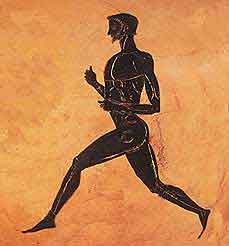|
|
And first, before they left the city, the generals sent off to Sparta a herald, one Pheidippides, who was by birth an Athenian, and by profession and practice a trained runner. . .
Phidippides or Pheidippides (or Philippides according to a text around 600 years later of Lucian) was send by the Athenians to Sparta as fast as possible he can to ask for help. The Spartans said that they will help after the moon was full (probably in order to let the Athenians alone with the Persians and not only for religious reasons). Phidippides came back running the 147 miles distance with the disappointing news for the Athenians. Phidippides then returned to Marathon in time to fight in the battle. He was ordered to run to Athens to bring the news of victory. In one week he had to run more than 300 miles.
Luc-Olivier Merson, 1869 When he reached the agora, he gasped: nenikikamen, "We have won" and dropped exhausted dead. The modern Marathon race commemorates his feat. Historians assumed that the Marathon battle date was 12 September 490 BC. New studies suggest that it was probably one month earlier. Interesting is that the temperature in August is usually higher than in September and this could be also more exhausting for Phidippides.
Phidippides with an important message for the Athenians and for all Hellenes: Nenikikamen Why did Phidippides not use a horse? Probably because for the large distance for a runner and considering the terrain (mountains, rivers, etc) it was much better not to use a horse. But did Phidippides really exist and if yes did he really die? Was the story invented by Herodotus? Nobody knows! Some other “Marathon” men Ageus, or Argeus (according to Robert in Hermes 1900 p. 154 Aegeus) a day-runner from Argos, was victor in Olympia in 328 B.C. the dolichos, and immediately left Olympia "And in Argos, on the very same day announced his victory (Euseb. Edition Schöne. I. p. 206). It should be noted that Olympia is about 100 kilometres distant direct from Argos. Another athlete, , look you, is already carried away captive; and Greece weakened by the loss of no mean city." Thus did Pheidippides deliver the message committed to him. And the Spartans wished to help the Athenians, but were unable to give them any present succour, as they did not like to break their established law. It was then the ninth day of the first decade; and they could not march out of Sparta on the ninth, when the moon had not reached the full. So they waited for the full of the moon. Pausanias ...when the Persians had landed in Attica Philippides was sent to carry the tidings to Lacedaemon. On his return he said that the Lacedacmonians had postponed their departure, because it was their custom not to go out to fight before the moon was full. Philippides went on to say that near Mount Parthenius he had been met by Pan, who told him that he was friendly to the Athenians and would come to Marathon to fight for them. This deity, then, has been honored for this announcement. Quotations We owe him a big "thank you" because men and women like him are the reason we still have our beautiful Hellas today. All the important ancient Greek cities still retain their original names and locations after thousands of years. ... we would say to him: "Pheidippides, here lies Sparta still; Tegea, Nauplion, Mycenae, Greeks today in the spirit of Pheidippides Nick Tsiotos, Andy Dabilis, Johnny Kelley, Running with Pheidippides: Stylianos Kyriakides, the Miracle Marathoner, Syracuse University Press 2001 Stylianos (Stelios) Kyriakides (Στυλιανός (Στέλιος) Κυριακίδης) (4.5.1910 or 15.1.1910 Statos/Pafos in Cyprus - ?.12.1987) winner of the Boston Marathon 20.4.1946 (in 2 hr 29 min 27 sec), ”A true son of Pheidippides, Grecian immortal who ran the first marathon almost 2500 years ago, The New York Times, 21.4.1946”, |


